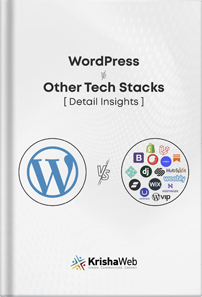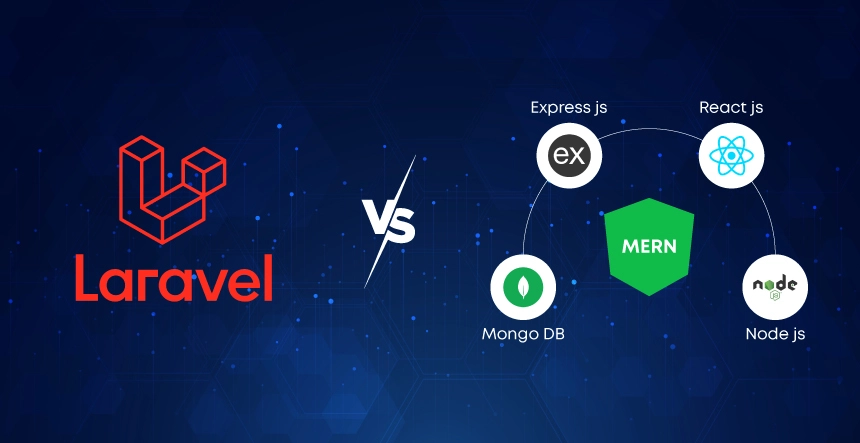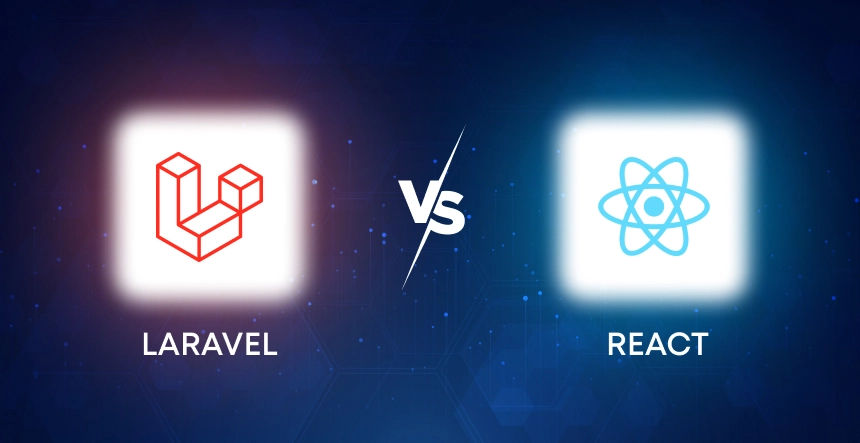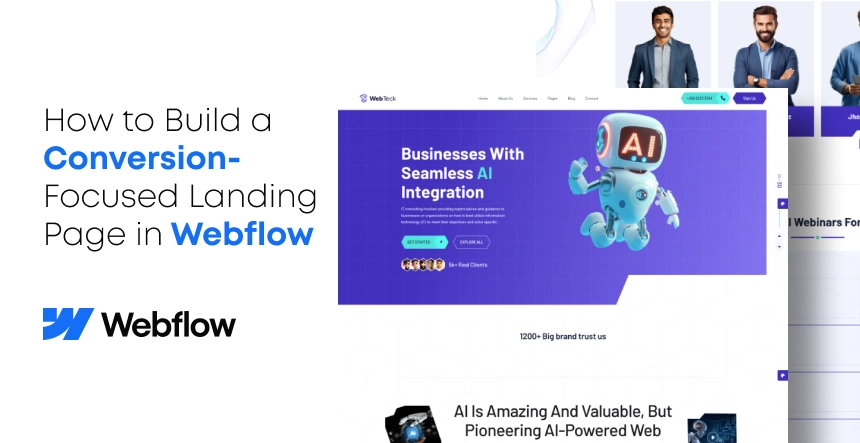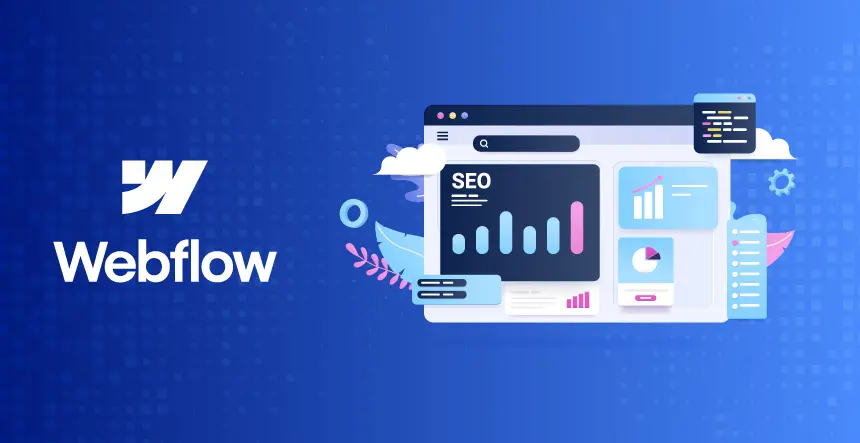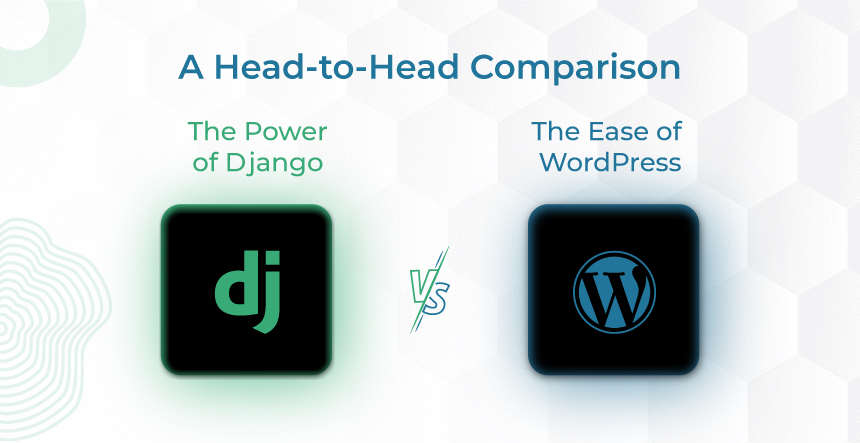
Web developers are increasingly using CMS platforms for building high-performing, feature-rich, custom websites.
As per statistics by Zippia, 43.6% of websites were built by customizing CMSs in 2022. It is observed that the use of CMSs for web development has increased over the last decade. In 2015, around 25% of sites were using CMS and this percentage has amplified by 75% between 2015 and 2022. In 2023, you will find more websites being developed by customizing popular CMS platforms like WordPress, Django, Drupal, Shopify, Wix, Joomla, etc.
Let us go through Django and WordPress to understand their differences (Django vs WordPress). And let’s find out how they both play a significant role in web development in the current era.
Briefing Django and WordPress as CMS Platforms
Django
Django came into existence in 2005 as a Python project and went on to become the best backend framework. It offers the most widely used Python library for web development and has 7 million downloads per month. Being a free and open-source framework with highly competitive features, it has many takers. As a solid backend framework, Django has a market share of 31.01%. To make things clear, Django is a python web framework and Django CMS is a wholesome CMS built on a python framework. Both have diverse features and are used for entirely different purposes. It’s important to keep that in mind.
Here, we will focus on Django vs WordPress and see their pros and cons to help you decide which CMS is best for you. The article emphasizes the ease of use of WordPress CMS and Django CMS. So, read on.
WordPress
Talking WordPress, it can be easily crowned as the king of CMSs with 43% market choosing it extensively for web development. Initially developed as a blogging platform, WordPress has evolved as a solid, feature-rich CMS with a huge fan following. Being a free, open-source CMS with thousands of themes and plugins to its credit, it is definitely the most popular CMS of the moment. It offers features to build all kinds of websites starting from a simple blog site, and layered eCommerce store to complex enterprise solutions. Built on PHP, WordPress CMS offers numerous functionalities that you can use to develop websites without writing a single line of code.
Now, that calls for applause! And, this makes it the most suitable choice for people who want to create websites but lack the knowledge of coding.
Head-to-Head Comparison Between WordPress and Django CMS
1) WordPress vs Django CMS – Which one is easy to use?
While WordPress is a beginner-friendly CMS that helps you create a website without touching a single line of code, Django CMS may prompt you to create a site from the scratch.
With WordPress, you can start building the site from its admin dashboard. You just need to install the WordPress software and start making your site. It offers all its built-in tools which help to create web pages and blog posts. You can add photos and videos through the Media option and create a visually stunning site. You just need to get acquainted with the dashboard and you will be ready to create the site. There are numerous WordPress tutorials on the web to help you learn the basics.
Once installed, Django CMS also offers a simple interface that helps you edit design elements for the front end. For beginners, it is advisable to take help from a Django CMS developer to avoid any hassles in the future. You can navigate and cover different areas of pages and access media libraries from sliding windows. Although the interface is simple, it demands some patience. You must have a crystal clear mind about your website structure to explore the Django CMS and customize it for the best results.
2) WordPress vs Django CMS – Customization
All CMSs offer built-in themes, plugins, and other software features, which can be customized to suffice your web development requirements. Customization helps to create quicker, better, and feature-rich websites. Most importantly it saves time to develop all these features from scratch.
Let us see the same for WordPress vs Django.
WordPress offers thousands of themes and templates to help you create a stunning user interface or front end for your website. You can choose a free or paid theme, and edit its features as per your need and the front end is ready! Next, you can add specific plugins to incorporate certain features into the site. For example, if you want to integrate social media platforms, then check them in the WordPress plugin directory, install them, and activate them. That’s it! You can also customize the page builder plugin and so on. All of these are available as a drag-and-drop facility, you can rearrange them and create excellent web pages.
The Django CMS also offers numerous plugins, which can be used to create buttons, heading, texts, etc. for the page. Customize them by changing color, font, and other elements. The content can be customized by rearranging the design elements in a relevant order. Again, Django CMS offers drag-and-drop features to facilitate the user. However, it helps if you are a Python developer to get the best out of Django CMS customization.
3) WordPress vs Django CMS – Design
Designing a website becomes extremely easy when you can choose the best one from the WordPress Themes Repository and customize it. Each theme offers its own template, which can be modified as required. You can change the layout, color combination, etc. WordPress has come up with the latest Full Site Editing feature that adds more options and flexibility to template customization. If you have ample time, you can even indulge in creating your own template with the help of WordPress’s block editor.
Contrary to WordPress, Django CMS does not offer any theme repository. So, you end up creating the web pages from scratch. What you can definitely do is select a template for your page and change the layout. Django CMS offers limited design options for site creation. However, it takes a lot of time and effort. If you don’t have bulk time at your disposal, then it’s better to choose WordPress over Django CMS.
4) WordPress vs Django Blog and Publishing Tools
We are living in a world of layered, complex, ever-optimizing websites. New features are added to sites with every passing day. In addition, to rank high on search engines and fulfil SEO demands, modern-day websites cannot afford to avoid blogs. You need capable publishing tools to periodically post new content on the site. Let us compare and contrast the publishing tools of these two powerful CMSs.
WordPress originated as a blogging platform, so it has better publishing tools than other CMSs. Most importantly these tools are user-friendly enough for a layman to create their own blog page content and post them. WordPress offers the Block Editor, which allows building pages and posts with pre-defined blocks. The blocks facilitate you to create headings, texts, buttons, lists, images, and other visible elements of the page. You can simply customize the block as per your vision of the page or post. It even allows you to save the pages and posts as drafts to edit them later. Moreover, you can schedule publishing posts in a certain order and even secure their visibility from other members. All of these make WordPress an ideal blogging platform for the new age sites.
On the other hand, Django CMS offers primitive blog development features. You can definitely write the content, meta descriptions, keywords, etc. in the blog window. However, publishing features like scheduling posts, authenticated visibility, access to the post, and other publishing facilities are missing here. It also lacks the blogging tools that help build a strong, robust blog site. This again brings us to the point that if you want a multifaceted blog, then WordPress is the way to go.
5) Django vs WordPress Performance and Security
As WordPress is popular and used extensively, it becomes vulnerable to threats as well. Hackers manipulate plugins and themes with malign code to enter websites and access their sensitive features like payment gateways. Therefore, a WordPress site needs constant updates, backups, and security checks. There is a provision to enable auto updates of every element including themes and plugins as well as schedule regular backups. You can also integrate security plugins for the safety of databases, files, and web pages. This demands extra effort from the site owner.
Well, Django CMS has an upper hand over WordPress when it comes to security. Based on a solid framework, the CMS offers many built-in features for authentication and security tools to save your site from hackers. It actually prevents cross-site forgery and SQL injection and therefore, keeps the site in safe hands. You don’t need to carry updates on a regular basis and even integrate security tools. So, when you want a highly secure site, rely on Django CMS.
6) WordPress vs Django CMS – eCommerce
For those who want to build a solid eCommerce store, a proper evaluation of Django CMS and WordPress is important.
As such WordPress doesn’t offer eCommerce tools, but you can still set up an elaborate online store through it. It allows the incorporation of eCommerce tools and plugins like WooCommerce. With this, you can use the WordPress dashboard to enable order processes and sales. You can add WooCommerce plugins to add other functionality like filters, customer reviews, etc. So, WordPress can still help to create a foolproof online store.
Django CMS is rightly useful for setting up an eCommerce store. Developers can rely on Django-SHOP documentation to get started. You can create tailor-made features for your web store with Django in the background. It adds flexibility and convenience to the eCommerce development process. Again, its security features guard the online store against any potential threats. Overall, Django CMS outstands WordPress when it’s to eCommerce development.
7) WordPress CMS vs Django CMS – Hosting options
For WordPress, you can choose shared hosting services or managed-to-host options. Regular websites can easily rely on low-cost shared hosting services from GoDaddy, Bluehost, OVH, Hostgator, etc. These plans often start from $3 to $25 per month and are quite budget friendly. Bootstrap companies or Startups can rely on better hosting options like DigitalOcean, Vultr VPS, etc. However, when you are making an enterprise-level website from WordPress CMS, you need to choose an exclusive hosting service, one which can withstand extensive scalability and still provide optimum performance. WordPress VIP is one such fully managed hosting service.
As far as Django CMS-based websites are concerned, you can choose trusted hosting services like Alwaysdata, Divio, djangoeurope, Nine – Cloud Navigators, etc. These are some of the hosting options trusted by Django CMS developers. For bigger sites with elaborate technicalities, you can rely on cloud hosting platforms like AWS, Azure, Google Cloud, etc. You need to do your research and find which one is best for you.
8) Django CMS vs WordPress – Popularity and Market Share
Popularity
Well, each has its own set of fan following. While WordPress enjoys mass popularity, Django is loved by a cult crowd that values site security over anything else. Some of the most popular sites using Django CMS are L’Oreal, Disqus, PADI Travel, Instagram, Spotify, Mint Museum, AAMC, Carnegie corporation, etc.
WordPress easily beats Django CMS in terms of global popularity. Some of the most well-known sites made through WordPress CMS are Vogue, TechCrunch, TIME Magazine, Microsoft News, Sony Music, TED Blog, Snoop Dogg etc.
Market share
While WordPress takes over 43% of the web development market, Django CMS is far behind with just 0.1% of users. However, both have their pros and cons, which we will discuss further in the article. Keep an open mind to make sure that you zero down on the best out of these two CMSs for your website development.
Let’s get some quick details on similarities and differences from the below Table…
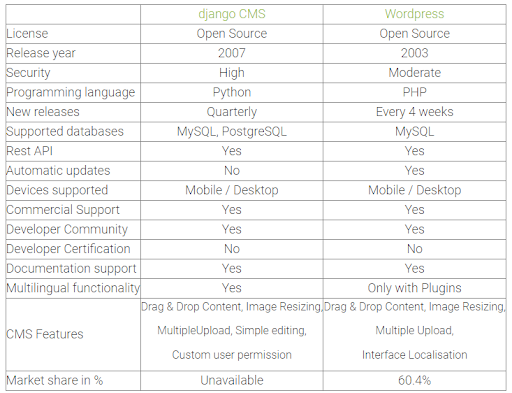
Source: http://www.django-cms.org
Other CMS Options You Can Explore
Some of the most widely used CMSs in the current times are WordPress, Drupal, Joomla, WooCommerce (eCommerce CMS from Automattic), Wix, etc.
Django vs WordPress vs Drupal
Talking about Django vs WordPress vs Drupal, we have already covered the first two in detail. Drupal is another open-source CMS and should be used for websites that handle huge amounts of data. There are various readily available modules and themes to incorporate and create a custom Drupal website. It has good support from the open-source community. Its market share has dampened from 6.1% to 1.8% between the period of 2011 and 2022. Also, you need an efficient Drupal developer to do all the development work for you. It is not as beginner friendly as WordPress.
Drupal vs WordPress vs Joomla vs Django
Joomla is another popular CMS that offers numerous templates and plugins. Released in 2005, this open-source CMS offers plenty of options to create wonderful websites, especially eCommerce sites. However, it is more complex and is advisable to be handled by developers than beginners. Unlike WordPress, it has limited extensions and themes. Overall, you need certain technical expertise to play with Joomla.
Concluding Here…
WordPress is a clear winner in the tug-of-war between Django CMS and WordPress CMS. It has everything required to create a fantastic website, blog site, enterprise site, and other kinds of web applications. When it’s to security, Django is a champ. It is also good for eCommerce development. However, it solely depends on your requirements, and therefore, one can’t rule out the possibility of using Django CMS over WordPress.
We hope the above-mentioned topics have added some light to your technical choices for website development. We will keep on adding more such information in the future. So, keep reading this space!
KrishaWeb is a leading web development company working with several technologies like WordPress, Magento, Shopify, WooCommerce, Drupal, and Laravel. We can assist you to build exclusive web applications that suffice all your requirements.
If you have a business idea in your mind, feel free to schedule a meeting and give wings to your dreams!
Girish Panchal
Technical ArchitectA Technical Architect, proficient in WordPress, Drupal, Laravel, and DevOps tasks, crafts robust IT solutions with a blend of expertise and versatility in web development and infrastructure management.





